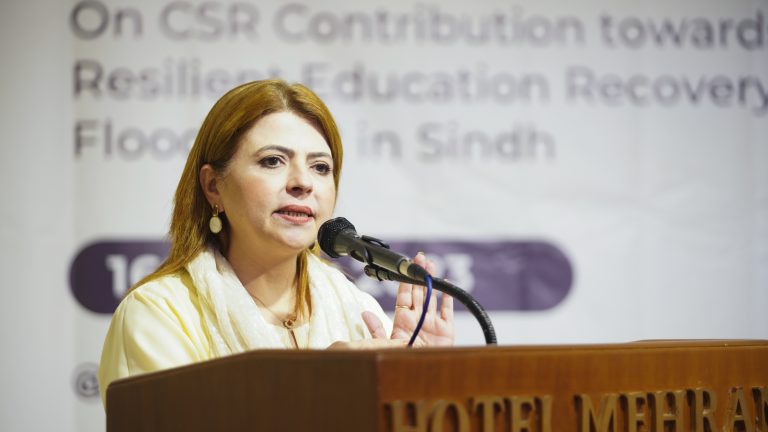
The report highlights several issues including lack of emergency response planning for flood-hit areas in the education system
By Sanjay Mathrani
Karachi, Sindh
Experts have stressed the need to take immediate measures to recover the loss of learning during floods and develop a flood-resilient education system to prevent disruption to education in such calamities.
This was stressed during the consultation on the report on the post-floods education situation in Pakistan – “Towards a Resilient Education Recovery from Pakistan’s Floods – Rapid Response Research,” published by Pakistan Coalition for Education (PCE) in collaboration with Education Champion Network (ECN).
A high-level consultative workshop on “CSR contribution towards resilient education recovery from flood 2022 in Sindh” took place on Tuesday by Thar Education Alliance (TEA).
The report highlighted several issues within education response in flood-affected areas. These include a lack of emergency response planning within the education system and a lack of focus on widespread learning poverty among students. The report calls for comprehensive coordination between the district, federal and provincial governments for recovering learning losses and enhancing the educational infrastructure in Pakistan. The report also stresses the need to focus on students’ learning, rather than mere enrollment and rebuilding infrastructure.
Speaking on the occasion, Chief Executive Officer, TEA, Partab Shivani said that to structure an effective response to educational needs, this important report asks for using rapid response mechanisms like a public-private partnership to help build schools at a faster pace and more importantly to ensure that all girls and boys who had to experience major learning losses can rapidly keep up with learning.
“In an effort to foster positive change and propel the progress of education, an appeal is being made to the corporate sector, multinational companies, and other organizations to step forward and contribute their Corporate Social Responsibility (CSR). By investing their CSR resources, these entities have the unique opportunity to make a lasting impact on the lives of countless students and shape the future of our society,” Shivani expressed.
Corporate entities can contribute towards vital aspects of education, such as infrastructure development, scholarship programs, teacher training initiatives, and access to digital learning resources. Such collaborative efforts have the potential to create a ripple effect that transcends borders and empowers generations to come. He said
Additional Secretary Education and Chief Advisor, Curriculum Wing Dr. Fouzia Khan said while speaking on the efforts of TEA in the province and endorsed that through collective action, said they can pave the way for a more equitable and inclusive education system. The transformative power of education is immeasurable, and by coming together, they can bridge the gap between potential and opportunity for millions of aspiring minds and by playing a pivotal role to create a world where every child has the chance to learn, grow, and succeed.
During an interactive discussion participants highlighted the need to address long-term learning losses, and jointly recommended that instead of waiting for re-building of schools to get children back to classrooms, standing community infrastructure ought to be used to begin learning activities, to work at district level to establish learning targets rather than infrastructure targets in medium and long-term planning towards, and to rebuild quickly and to a high quality, go through public-private sector partnerships.
Around two dozen people from corporate sector, multinational companies, banking sector and education based organizations actively participated in the workshop. The report also stresses the need to focus on students’ learning, rather than mere enrollment and rebuilding infrastructure.
_______________